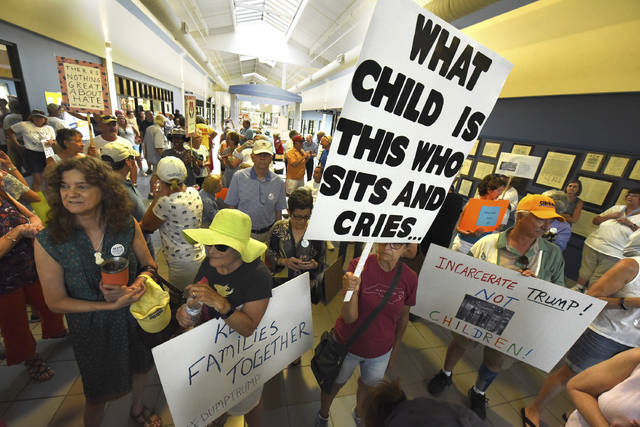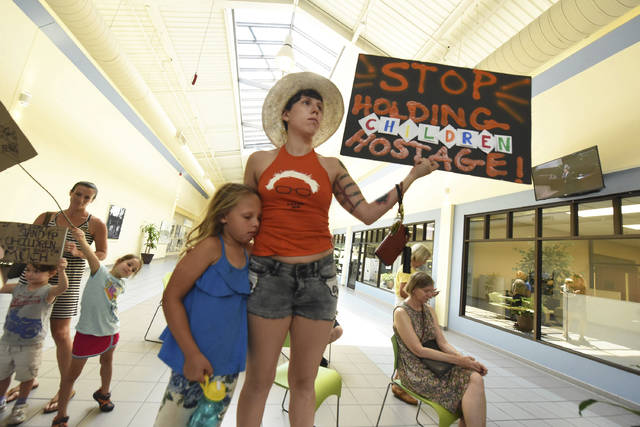SAN FRANCISCO — In an outpouring of concern prompted by images and audio of children crying for their parents, hundreds of thousands of people worldwide are donating to nonprofit organizations to help families being separated at the U.S.-Mexico border.
Among those that have generated the most attention is a fundraiser on Facebook started by a Silicon Valley couple, who say they felt compelled to help after they saw a photograph of a Honduran toddler sobbing as her mother was searched by a U.S. border patrol agent. The fundraiser started by David and Charlotte Willner had collected more than $13 million by Wednesday afternoon.
The Willners, who have a 2-year-old daughter, set up the “Reunite an immigrant parent with their child” fundraiser on Saturday hoping to collect $1,500 — enough for one detained immigrant parent to post bond — but money began pouring in and within days people had donated $5 million to help immigrant families separated under the Trump administration’s “zero-tolerance” policy that criminally prosecutes all adults caught crossing the border illegally.
“What started out as a hope to help one person get reunited with their family has turned into a movement that will help countless people,” the couple said in a statement released by a spokeswoman Wednesday. The couple, who were early employees at Facebook, declined to be interviewed. “Regardless of political party, so many of us are distraught over children being separated from their parents at the border.”
The money collected from more than 300,000 people in the United States and around the world will be given to the Refugee and Immigrant Center for Education and Legal Services, or RAICES, a Texas nonprofit that that offers free and low-cost legal services to immigrants.
After days of mounting pressure, President Donald Trump signed an executive order Wednesday ending the process of separating children from families at the border. The order keeps families together while they are in custody, expedites their cases, and asks the Department of Defense to help house them but it is not clear what will happen to the families who have already been separated.
“The photos of the little girl crying while her mother is body searched/removing her shoe laces has rocked me to my core,” Natalia Barnes, of New Zealand, wrote on RAICES’s Facebook page. “Please tell us you will be able to reunite that baby with her mother!!”
RAICES said Wednesday it will use the funds not only to reunite families and provide legal services, but to start a joint reunification fund for the more than 2,300 migrant children that have been separated from their families at the border with Mexico since May.
“We’ve been occasionally crying around the office all day when we check the fundraising totals,” RAICES wrote on Facebook. “This is such a profound rejection of the cruel policies of this administration. Take heart.”
Donations have also been pouring in at the American Civil Liberties Union, which has focused on defending immigrant families, said Mark Wier, the ACLU’s chief development officer.
The ACLU has raised $2.5 million online from more than 40,000 people since June 14, when celebrity couple Chrissy Teigen and John Legend donated $72,000 each to the organization in honor of Trump’s 72nd birthday.
“We’ve also seen people launch more than 200 peer-to-peer fundraising campaigns on the ACLU’s website alone,” he said.
The outpouring is similar to the promulgation of the Trump administration’s first so-called Muslim ban in January 2017, when the ACLU received $24 million in online donations in two days, Wier said.
RAICES, which has 50 lawyers, said it also plans to hire more attorneys, train more volunteers and even set up a network of therapists and psychologists to help children when they leave detention, Jenny Hixon, RAICES’s development director, told the Washington Post.
“It’s not just the funding. We’re getting literally thousands of people contacting us, wanting to volunteer. Many are like, ‘I’ll come to Texas,’” Hixon said.
Markus Klofelt, a father of two from Stockholm, Sweden, said he felt compelled to help after seeing his Facebook newsfeed filled with news about families being torn apart.
“As parents and out of humanity and morality, we felt we needed to be part of this campaign,” Klofelt said.
The technology consultant said the news in Sweden has also been overwhelmingly about what is happening in the United States even though Europe is also struggling to deal with an influx of refugees from Africa and the Middle East.



